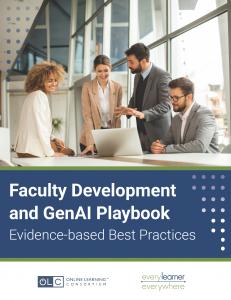New GenAI Playbook Transforms Faculty Development in Effective GenAI Integration
Advancing teaching excellence with research driven best practices
BOULDER, CO, UNITED STATES, October 14, 2025 /EINPresswire.com/ -- A new faculty development playbook from the Online Learning Consortium (OLC) in partnership with Every Learner Everywhere, offers guidance on the scope and direction of Generative AI (GenAI) policies and discussions in today’s higher education landscape. The Faculty Development and GenAI Playbook: Evidence-based Best Practices, provides strategies to Faculty Development practitioners in Centers of Teaching and Learning (CTL) to develop effective and valuable programming around GenAI. Grounded in research, this playbook is designed to guide faculty development professionals in colleges, universities, and other higher education organizations to help develop and implement GenAI professional development opportunities for faculty and staff.
Faculty development is a critical lever for enhancing teaching and learning in today’s higher education landscape. To explore and evaluate the strategies, challenges, and resources employed by CTLs in higher education institutions across the United States in response to the rapid emergence of GenAI technologies in academic settings, OLC researchers conducted a mixed-methods study. By conducting a comprehensive survey followed by in-depth interviews with CTL leaders and directors, this research sought to provide a nuanced understanding of the current landscape of GenAI integration in higher education and to identify best practices and future directions for supporting faculty in this evolving educational environment.
Key findings include:
Widespread Acknowledgement of GenAI’s Permanence: Across the dataset, both survey and interview respondents expressed strong consensus that GenAI is here to stay.
Diverse and Evolving Faculty Development Models: Most CTLs offer multi-pronged approaches: webinars, book clubs, microcredentials, modular courses, and department-specific consultations.
Pragmatic Faculty Engagement with Nuanced Resistance: Barriers to engagement include time constraints, lack of institutional incentives, and emotional/ethical tensions surrounding AI.
Policy Approaches: Decentralized but Guided: Institutions generally avoid rigid, centralized policies in favor of guidance frameworks, such as the "traffic light" (Red/Yellow/Green) model.
Positive and Negative Pedagogical Impacts: Positive uses include brainstorming, assignment revision, generating feedback, and simulating case scenarios.
Resource Limitations and Structural Challenges: Most programs operate with limited staffing, budgets, and incentives. Common CTL sentiments include being under-resourced and over-extended.
Future Directions: Embedded AI Literacy and Scalable Infrastructure: Programs emphasize the need for agility — short-term planning cycles, rapid iteration, and ongoing environmental scanning.
Since the public release of ChatGPT in late 2022, higher education staff supporting faculty have had to swiftly incorporate training and programs to teach educators how to: (1) address students using GenAI for assignments, (2) prepare students for a future workplace where GenAI is ubiquitous, and (3) use GenAI to enhance course quality and efficiency. According to our survey of CTL leaders, over 84% of respondents ranked “ethical and responsible use of GenAI” as either “very” or “critically” important, setting the stage for this playbook’s focus on trust-building and transparency.
"This resource reflects what’s possible when institutions, networks, and educators come together around a shared goal: helping faculty use AI to strengthen—not replace—the human elements of teaching and learning," said Carrie Lewis Miller, PhD, Senior Researcher at the Online Learning Consortium and co-author of the playbook. "This resource is a guide for building capacity, trust, and innovation across higher education. Built on a four-stage model that moves from Awareness to Iteration, the playbook offers step-by-step guidance for centers of teaching and learning to maximize their resources and lead effective, sustainable GenAI professional development."
The playbook addresses how faculty developers can quickly and effectively prepare faculty to integrate GenAI into their curriculum in a way that enhances teaching and learning. It outlines multiple approaches to developing and implementing GenAI programming for faculty at higher education institutions. Faculty aren’t just learning a new tool — they’re being asked to reimagine their professional identity and instructional purpose in a rapidly changing landscape. The hope is that this playbook helps institutions create faculty development that rises to the challenge of today’s evolving teaching and learning landscape.
The full resource, Faculty Development and GenAI Playbook: Evidence-based Best Practices, is available for download at https://www.everylearnereverywhere.org/resources/faculty-development-and-gen-ai-playbook/. To download the free resource or learn more about Every Learner Everywhere and its collaborative approach to improved student success in higher education through digital learning, visit everylearnereverywhere.org. To contact Every Learner Everywhere, email everylearner@wiche.edu, or call (303) 541-0208. Follow Every Learner on LinkedIn at Every Learner Everywhere.
###
The Online Learning Consortium is a collaborative community of education leaders and innovators dedicated to advancing quality digital teaching and learning experiences designed to reach and engage the modern learner — anyone, anywhere, anytime. OLC inspires innovation and quality through an extensive set of resources, including best-practice publications, quality benchmarking, leading-edge instruction, community-driven conferences, practitioner-based and empirical research, and expert guidance. The growing OLC community includes faculty members, administrators, trainers, instructional designers, and other learning professionals, as well as educational institutions, professional societies, and corporate enterprises. Learn more at onlinelearningconsortium.org.
Every Learner Everywhere is a network of partner organizations with expertise in evaluating, implementing, scaling, and measuring the efficacy of education technologies, curriculum and course design strategies, teaching practices, and support services that personalize instruction for students in blended and online learning environments. Our mission is to partner with institutions to harness digital learning technology, driving innovation in higher education to improve outcomes for every learner. We build capacity in colleges and universities to improve student outcomes with digital learning through direct technical assistance, timely resources and toolkits, and ongoing analysis of institutional practices and market trends.
Emilie Cook
Western Interstate Commission for Higher Education
+14435407320 ext.
email us here
Visit us on social media:
LinkedIn
YouTube
Legal Disclaimer:
EIN Presswire provides this news content "as is" without warranty of any kind. We do not accept any responsibility or liability for the accuracy, content, images, videos, licenses, completeness, legality, or reliability of the information contained in this article. If you have any complaints or copyright issues related to this article, kindly contact the author above.

